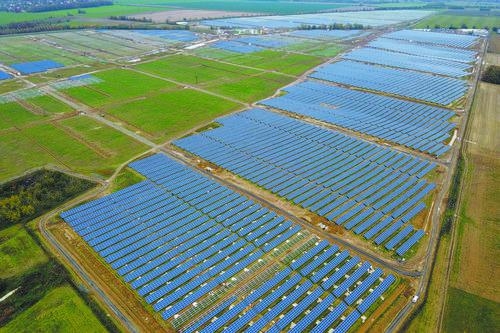China's Overseas Coal Plant Ban Lauded

Hungarian Kaposvár photovoltaic power station is one of the major projects
of which China cooperates with other countries in the fields of green development under the framework of the Belt and Road Initiative. (PHOTO: XINHUA)
By YU Haoyuan
China will step up support for other developing countries in evolving green and low-carbon energy, and will not build new coal-fired power plants abroad. That's according to President Xi Jinping who told the General Debate of the 76th Session of the United Nations General Assembly via video that China intends to promote the harmony between people and nature. This is a significant commitment to the whole world which will pave the way for a greener future.
Financial sacrifice for global climate change goal
UN Secretary-General Antonio Guterres hailed Xi's announcement. He welcomed China's actions of no longer building coal-fired power plants outside China and its support of green and low carbon energy. "Accelerating the global phase-out of coal is the single most important step to keep the 1.5 degree goal of the Paris Agreement within reach," said Guterres.
The commitments pointed out that China's energy sector will need to undergo a complete shift from its current coal-based structure to a low-carbon power system, said Xinyue Ma, the China Research and Project leader at Boston University's Global Development Policy Center.
The great financial sacrifice of China has also been mentioned in some think thanks. Reuters, quoting the Global Energy Monitor, a U.S. think tank, said 44 coal plants outside China earmarked for financing by the Chinese government could be affected. "This has the potential to reduce future carbon dioxide emissions by 200 million tons a year."
Adapting to green development demands
In an article by Dr. Richard Dixon that appeared in The Scotsman website on September 30, the writer said that China's decision to end funding for overseas coal -fired power plants will have delighted green campaigners in Africa, where billions of RMB will be invested in new plants.
Dixon claimed that Africans have already felt the significant climate impact on their daily life so that many countries have given strong resistance to proposed coal plants. Some international organizations oppose the proposal of coal plants in more than 20 African countries, including South Africa, Kenya, and Zimbabwe. As a major supporter of many of these plants, Chinese state finance is now making new coal plants very unlikely.
Independent Australia reports that the Chinese Government is making progress in reducing carbon emissions through its technology and energy sectors. John Quiggin, a professor of Economics at the University of Queensland wrote in Independent Australia that the Chinese government is making progress in reducing carbon emissions through its technology and energy sectors.
"China's National Development and Reform Commission has released a new plan on energy consumption that includes requiring all provinces to review already permitted high emissions projects, including those under construction. Combined with the emissions trading market launched this July, the plan suggests that Xi's stated goal of reaching a peak in China's coal consumption by 2026 may well be reached," Quiggin added.
Boston University publication BU Today also conducted a research on the importance of Xi's coal promise. According to Xinyue Ma, China contributed about 50 percent of the global international public finance commitments between 2013 and 2018. Ending overseas coal plant projects is a significant step for China. As the biggest developing country with the largest annual CO2 emissions, it is significant for China to make firm climate commitments at home and abroad, the research showed.
Helping developing nations to achieve their emission reduction targets
Boston University's Global Development Policy Center, which conducted data analysis in 2019, assumed that if all plants under construction and under planning were initiated with no plants closing by 2033, Chinese financed coal - fired power plants abroad are estimated to emit 433 million tons of carbon dioxide a year, this included more than 64.2 million tons in Africa.
China began its greener projects some time ago. Over the last decade, China has supported many developing countries to increase their energy power generation capacity through financing, affordable technologies, and fast project delivery.
Following the coal-plant ban abroad commitment, China has taken the first step to stop funding overseas coal plants: The Bank of China, the world's biggest supporter of coal power for the past five years, announced that it would no longer provide financial support for new coal mining and coal-fired power projects outside China.

